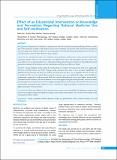Please use this identifier to cite or link to this item:
https://hdl.handle.net/20.500.14356/1559| Title: | Effect of an Educational Intervention on Knowledge and Perception Regarding Rational Medicine Use and Self-medication |
| Authors: | Jha, Nisha Shankar, Pathiyil Ravi Marasini, Anurag |
| Citation: | JhaN., ShankarP. R., & MarasiniA. (2018). Effect of an Educational Intervention on Knowledge and Perception Regarding Rational Medicine Use and Self-medication. Journal of Nepal Health Research Council, 16(3), 313-320. https://doi.org/10.33314/jnhrc.v16i3.1495 |
| Issue Date: | 2018 |
| Publisher: | Nepal Health Research Council |
| Article Type: | Original Article |
| Keywords: | Female community health volunteers Health care professionals Media Rational medicine use Self medication |
| Series/Report no.: | Jul-Sep 2018;1495 |
| Abstract: | Abstract Background: Rational use of medicines is important for safe and cost-effective pharmacotherapy. However, nearly half of the medicines available in the market may be used irrationally. The present study assessed the perceptions and knowledge about rational medicine use and responsible self-medication among participants before and after an educational intervention at KIST Medical College, Lalitpur. Methods: An educational module was conducted among healthcare professionals, media personnel and female community health volunteers. The questionnaire was administered before and immediately after the module. The areas addressed were rational medicine use, ethical prescribing, rational drug use situation in Nepal, pharmaceutical promotion, rational self-medication, safe use of antibiotics, and drug use problems in Nepal. Results: Among healthcare professionals, the rational drug use situation in Nepal and the total score significantly increased post-intervention (p<0.05). Among media personnel the mean scores increased significantly in pharmaceutical promotion and drug use problems in Nepal areas but there was a significant decrease in safe use of antibiotics. The pre-intervention pharmaceutical promotion score was significantly higher among healthcare professionals compared to media personnel while the rational self-medication scores were highest among female community health volunteers, safe use of antibiotics scores were highest among the media personnel. Post-intervention the mean pharmaceutical promotion scores was highest among healthcare professionals, rational self-medication scores among female community health volunteers, safe use of antibiotics, drug use problems in Nepal and total scores were highest among the media personnel. Conclusions: There were differences in the mean pre-intervention scores among different subgroups. A single session may not be enough to bring about significant changes in knowledge and perception. The retention of knowledge could be measured in future studies. Keywords: Female community health volunteers; health care professionals; media; rational medicine use; self medication. |
| Description: | Original Article |
| URI: | http://103.69.126.140:8080/handle/20.500.14356/1559 |
| ISSN: | Print ISSN: 1727-5482; Online ISSN: 1999-6217 |
| Appears in Collections: | Vol. 16 No. 3 Issue 40 Jul - Sep 2018 |
Files in This Item:
| File | Description | Size | Format | |
|---|---|---|---|---|
| 1495-Manuscript-6654-1-10-20181030.pdf | Fulltext Article. | 252.33 kB | Adobe PDF |  View/Open |
Items in DSpace are protected by copyright, with all rights reserved, unless otherwise indicated.
